Unit 1 Where did you go on vacation? 知识梳理学案
文档属性
| 名称 | Unit 1 Where did you go on vacation? 知识梳理学案 |
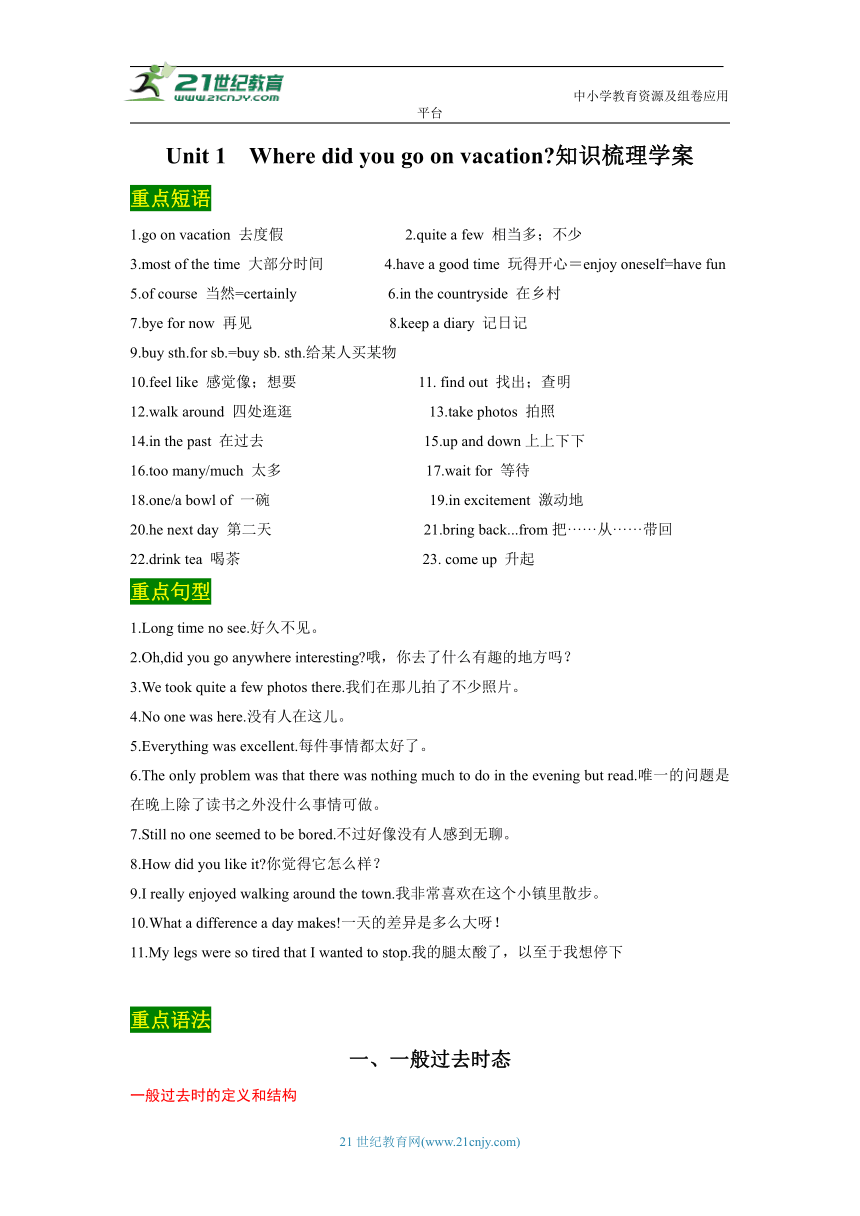
|
|
| 格式 | docx | ||
| 文件大小 | 54.7KB | ||
| 资源类型 | 试卷 | ||
| 版本资源 | 人教新目标(Go for it)版 | ||
| 科目 | 英语 | ||
| 更新时间 | 2023-10-12 00:00:00 | ||
图片预览

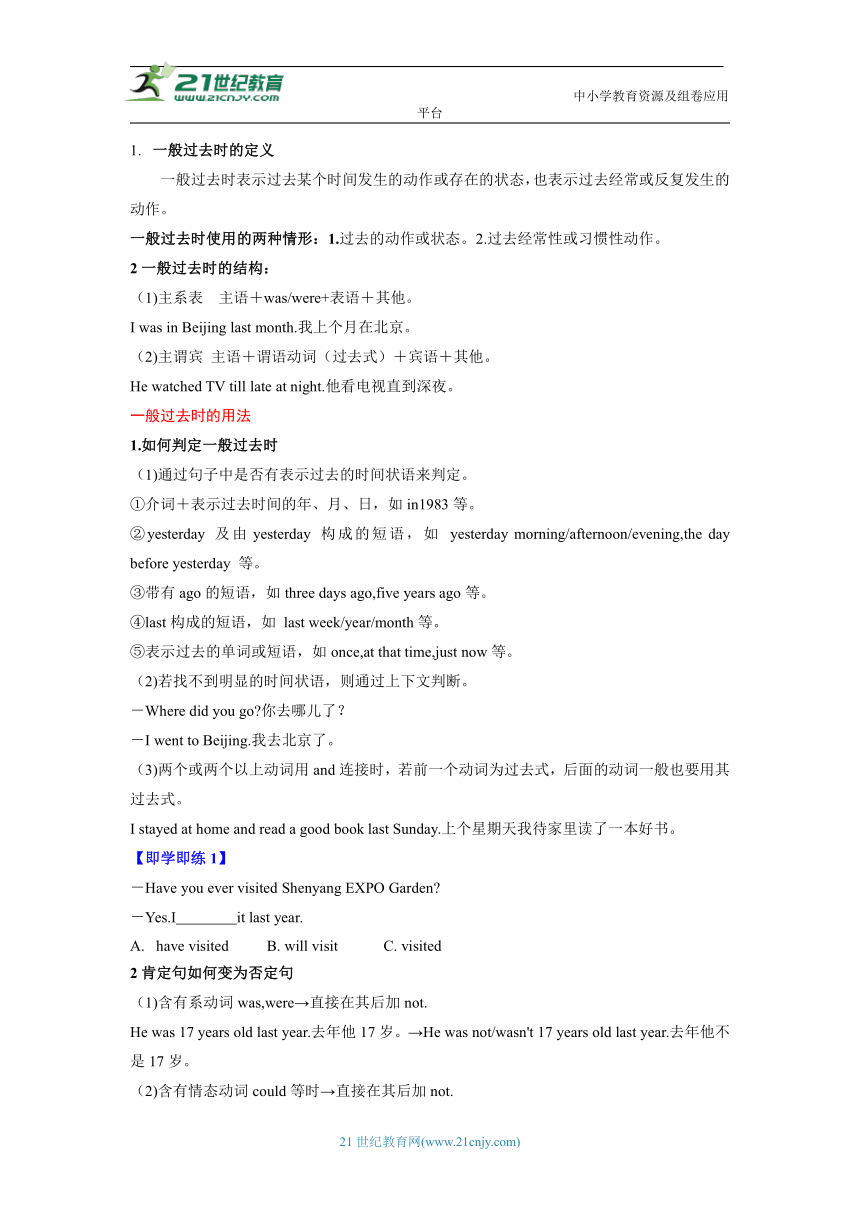
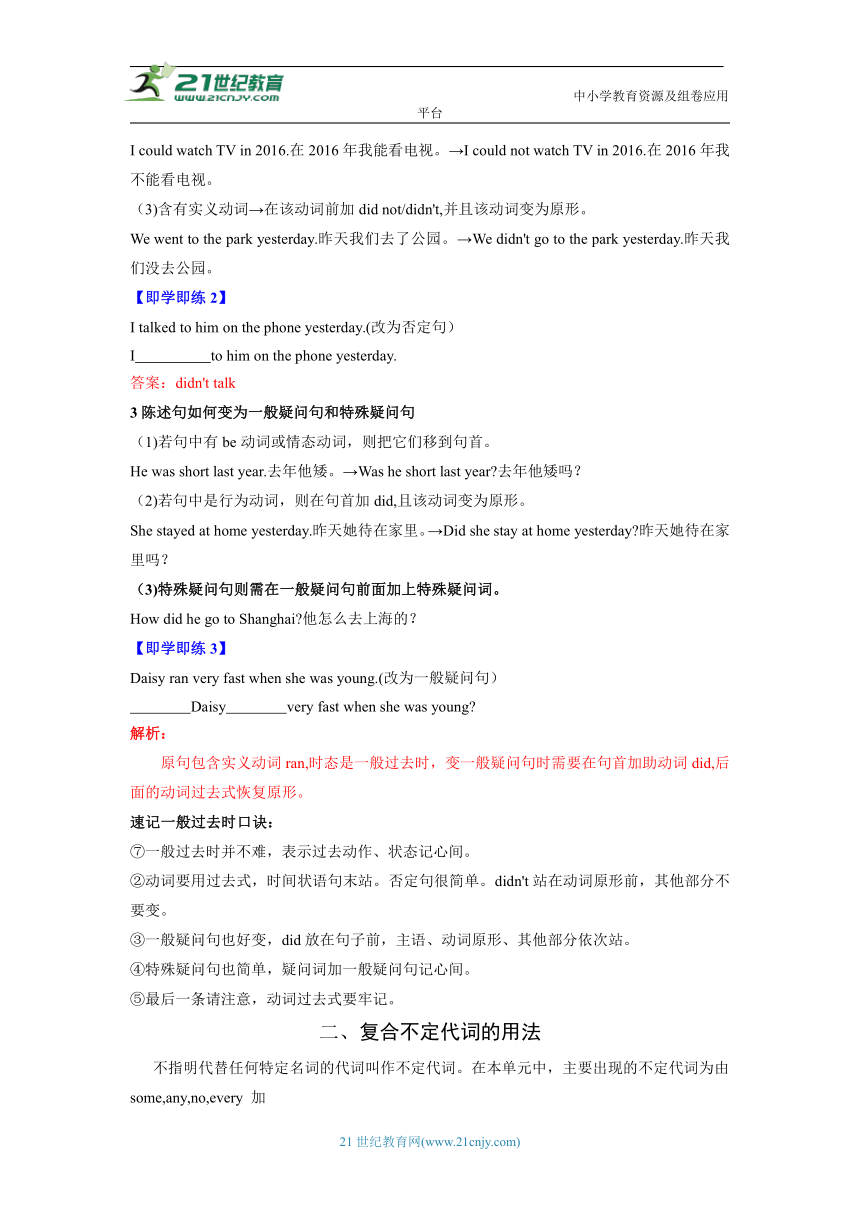
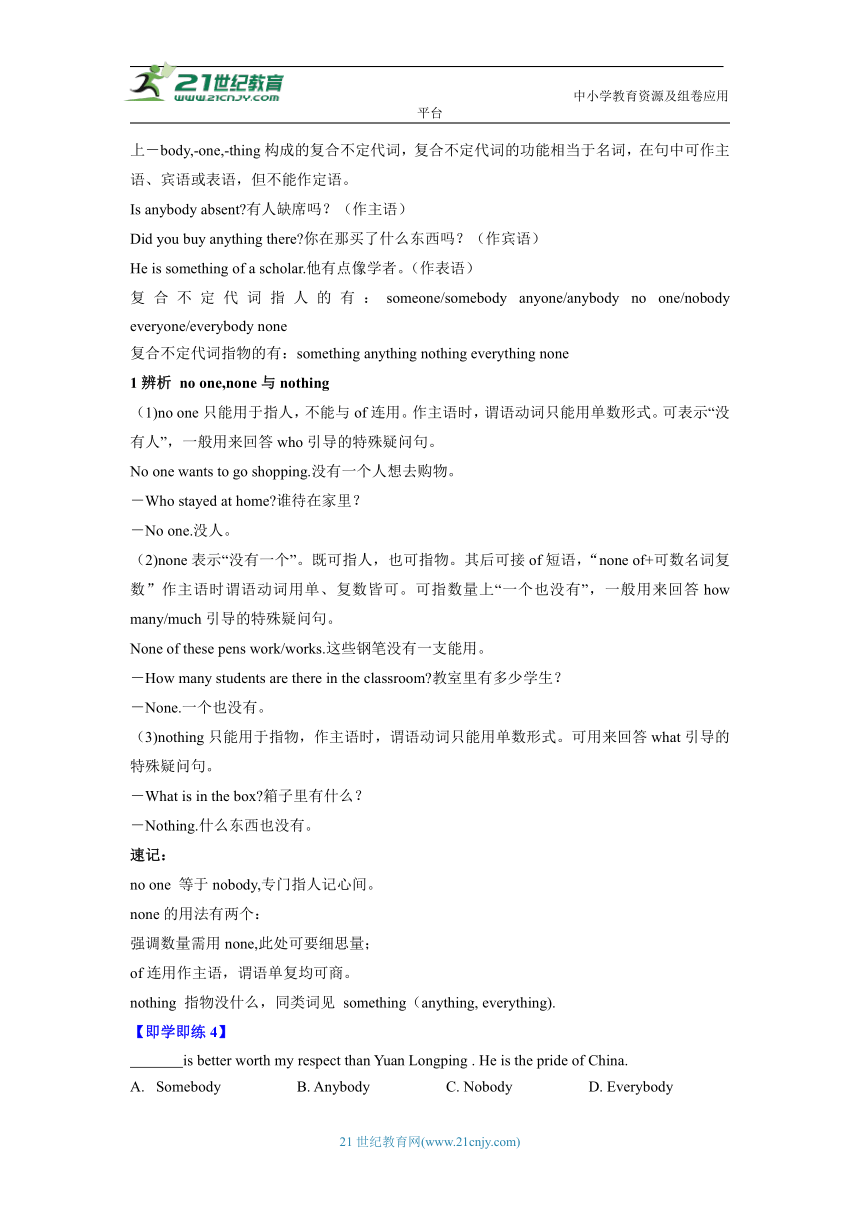
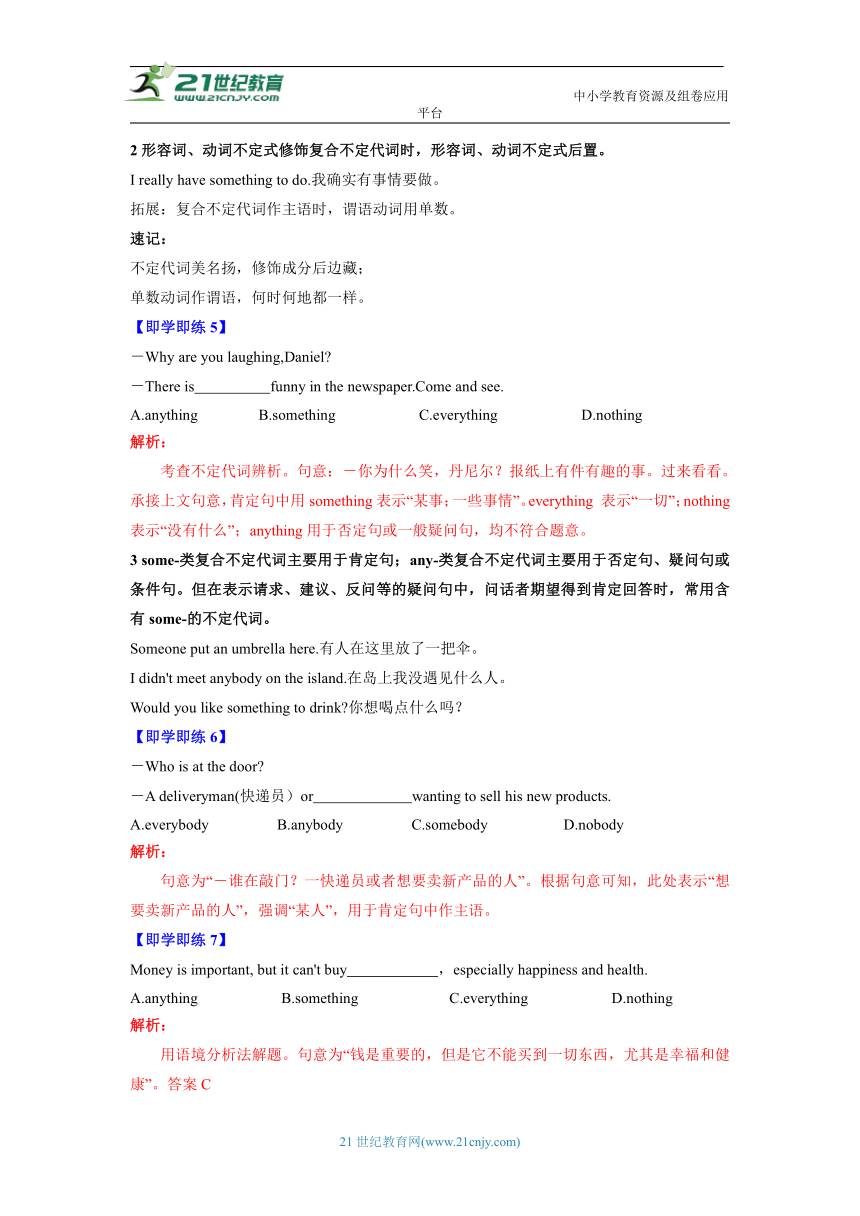
文档简介
中小学教育资源及组卷应用平台
Unit 1 Where did you go on vacation 知识梳理学案
重点短语
1.go on vacation 去度假 2.quite a few 相当多;不少
3.most of the time 大部分时间 4.have a good time 玩得开心=enjoy oneself=have fun
5.of course 当然=certainly 6.in the countryside 在乡村
7.bye for now 再见 8.keep a diary 记日记
9.buy sth.for sb.=buy sb. sth.给某人买某物
10.feel like 感觉像;想要 11. find out 找出;查明
12.walk around 四处逛逛 13.take photos 拍照
14.in the past 在过去 15.up and down上上下下
16.too many/much 太多 17.wait for 等待
18.one/a bowl of 一碗 19.in excitement 激动地
20.he next day 第二天 21.bring back...from把······从······带回
22.drink tea 喝茶 e up 升起
重点句型
1.Long time no see.好久不见。
2.Oh,did you go anywhere interesting 哦,你去了什么有趣的地方吗?
3.We took quite a few photos there.我们在那儿拍了不少照片。
4.No one was here.没有人在这儿。
5.Everything was excellent.每件事情都太好了。
6.The only problem was that there was nothing much to do in the evening but read.唯一的问题是在晚上除了读书之外没什么事情可做。
7.Still no one seemed to be bored.不过好像没有人感到无聊。
8.How did you like it 你觉得它怎么样?
9.I really enjoyed walking around the town.我非常喜欢在这个小镇里散步。
10.What a difference a day makes!一天的差异是多么大呀!
11.My legs were so tired that I wanted to stop.我的腿太酸了,以至于我想停下
重点语法
一、一般过去时态
一般过去时的定义和结构
一般过去时的定义
一般过去时表示过去某个时间发生的动作或存在的状态,也表示过去经常或反复发生的动作。
一般过去时使用的两种情形:1.过去的动作或状态。2.过去经常性或习惯性动作。
2一般过去时的结构:
(1)主系表 主语+was/were+表语+其他。
I was in Beijing last month.我上个月在北京。
(2)主谓宾 主语+谓语动词(过去式)+宾语+其他。
He watched TV till late at night.他看电视直到深夜。
一般过去时的用法
1.如何判定一般过去时
(1)通过句子中是否有表示过去的时间状语来判定。
①介词+表示过去时间的年、月、日,如in1983等。
②yesterday 及由yesterday 构成的短语,如 yesterday morning/afternoon/evening,the day before yesterday 等。
③带有ago的短语,如three days ago,five years ago等。
④last构成的短语,如 last week/year/month等。
⑤表示过去的单词或短语,如once,at that time,just now等。
(2)若找不到明显的时间状语,则通过上下文判断。
-Where did you go 你去哪儿了?
-I went to Beijing.我去北京了。
(3)两个或两个以上动词用and连接时,若前一个动词为过去式,后面的动词一般也要用其过去式。
I stayed at home and read a good book last Sunday.上个星期天我待家里读了一本好书。
【即学即练1】
-Have you ever visited Shenyang EXPO Garden
-Yes.I it last year.
have visited B. will visit C. visited
2肯定句如何变为否定句
(1)含有系动词was,were→直接在其后加not.
He was 17 years old last year.去年他17岁。→He was not/wasn't 17 years old last year.去年他不是17岁。
(2)含有情态动词could等时→直接在其后加not.
I could watch TV in 2016.在2016年我能看电视。→I could not watch TV in 2016.在2016年我不能看电视。
(3)含有实义动词→在该动词前加did not/didn't,并且该动词变为原形。
We went to the park yesterday.昨天我们去了公园。→We didn't go to the park yesterday.昨天我们没去公园。
【即学即练2】
I talked to him on the phone yesterday.(改为否定句)
I to him on the phone yesterday.
答案:didn't talk
3陈述句如何变为一般疑问句和特殊疑问句
(1)若句中有be动词或情态动词,则把它们移到句首。
He was short last year.去年他矮。→Was he short last year 去年他矮吗?
(2)若句中是行为动词,则在句首加did,且该动词变为原形。
She stayed at home yesterday.昨天她待在家里。→Did she stay at home yesterday 昨天她待在家里吗?
(3)特殊疑问句则需在一般疑问句前面加上特殊疑问词。
How did he go to Shanghai 他怎么去上海的?
【即学即练3】
Daisy ran very fast when she was young.(改为一般疑问句)
Daisy very fast when she was young
解析:
原句包含实义动词ran,时态是一般过去时,变一般疑问句时需要在句首加助动词did,后面的动词过去式恢复原形。
速记一般过去时口诀:
⑦一般过去时并不难,表示过去动作、状态记心间。
②动词要用过去式,时间状语句末站。否定句很简单。didn't站在动词原形前,其他部分不要变。
③一般疑问句也好变,did放在句子前,主语、动词原形、其他部分依次站。
④特殊疑问句也简单,疑问词加一般疑问句记心间。
⑤最后一条请注意,动词过去式要牢记。
二、复合不定代词的用法
不指明代替任何特定名词的代词叫作不定代词。在本单元中,主要出现的不定代词为由some,any,no,every 加
上-body,-one,-thing构成的复合不定代词,复合不定代词的功能相当于名词,在句中可作主语、宾语或表语,但不能作定语。
Is anybody absent 有人缺席吗?(作主语)
Did you buy anything there 你在那买了什么东西吗?(作宾语)
He is something of a scholar.他有点像学者。(作表语)
复合不定代词指人的有:someone/somebody anyone/anybody no one/nobody everyone/everybody none
复合不定代词指物的有:something anything nothing everything none
1辨析 no one,none与nothing
(1)no one只能用于指人,不能与of连用。作主语时,谓语动词只能用单数形式。可表示“没有人”,一般用来回答who引导的特殊疑问句。
No one wants to go shopping.没有一个人想去购物。
-Who stayed at home 谁待在家里?
-No one.没人。
(2)none表示“没有一个”。既可指人,也可指物。其后可接of短语,“none of+可数名词复数”作主语时谓语动词用单、复数皆可。可指数量上“一个也没有”,一般用来回答how many/much引导的特殊疑问句。
None of these pens work/works.这些钢笔没有一支能用。
-How many students are there in the classroom 教室里有多少学生?
-None.一个也没有。
(3)nothing只能用于指物,作主语时,谓语动词只能用单数形式。可用来回答what引导的特殊疑问句。
-What is in the box 箱子里有什么?
-Nothing.什么东西也没有。
速记:
no one 等于nobody,专门指人记心间。
none的用法有两个:
强调数量需用none,此处可要细思量;
of连用作主语,谓语单复均可商。
nothing 指物没什么,同类词见 something(anything, everything).
【即学即练4】
is better worth my respect than Yuan Longping . He is the pride of China.
Somebody B. Anybody C. Nobody D. Everybody
2形容词、动词不定式修饰复合不定代词时,形容词、动词不定式后置。
I really have something to do.我确实有事情要做。
拓展:复合不定代词作主语时,谓语动词用单数。
速记:
不定代词美名扬,修饰成分后边藏;
单数动词作谓语,何时何地都一样。
【即学即练5】
-Why are you laughing,Daniel
-There is funny in the e and see.
A.anything B.something C.everything D.nothing
解析:
考查不定代词辨析。句意:-你为什么笑,丹尼尔?报纸上有件有趣的事。过来看看。承接上文句意,肯定句中用something表示“某事;一些事情”。everything 表示“一切”;nothing 表示“没有什么”;anything用于否定句或一般疑问句,均不符合题意。
3 some-类复合不定代词主要用于肯定句;any-类复合不定代词主要用于否定句、疑问句或条件句。但在表示请求、建议、反问等的疑问句中,问话者期望得到肯定回答时,常用含有some-的不定代词。
Someone put an umbrella here.有人在这里放了一把伞。
I didn't meet anybody on the island.在岛上我没遇见什么人。
Would you like something to drink 你想喝点什么吗?
【即学即练6】
-Who is at the door
-A deliveryman(快递员)or wanting to sell his new products.
A.everybody B.anybody C.somebody D.nobody
解析:
句意为“-谁在敲门?一快递员或者想要卖新产品的人”。根据句意可知,此处表示“想要卖新产品的人”,强调“某人”,用于肯定句中作主语。
【即学即练7】
Money is important, but it can't buy ,especially happiness and health.
A.anything B.something C.everything D.nothing
解析:
用语境分析法解题。句意为“钱是重要的,但是它不能买到一切东西,尤其是幸福和健康”。答案C
三、感叹句的用法
教材原句What a difference a day makes!一天的差异是多么大呀!(P5)
句子结构分析 本句强调名词difference.
What a difference a day makes!
感叹词 中心词(名词)主语 谓语
用法 本句是what引导的感叹句,what感叹名词或名词短语,结构为+a(n)+可数名词单数十主语十谓语!”,主谓可省略,名词前可加形容词。
What a wonderful report he wrote!他写的报告真精彩!
拓展 感叹句
What+a/an+形容词+可数名词单数(+主语+谓语)!
What+形容词+不可数名词/可数名词复数(+主语+谓语)!
How+形容词/副词+主语+谓语!(主谓都可省略)
How+主语+谓语!
What a heavy box it is!它是一个多么重的箱子啊!
What good weather it is today!今天天气真好啊!
How time flies!时光飞逝!
How fast they are running!他们跑得真快啊!
-This is a photo of our family. Would you like to see it
-Wow! happy family!
What a B. How a C. What
解析:
考查感叹句。句意为“这是一张我们家的全家福。你想看它吗?”“哇!多么开心的一家人啊!”。what对名词或名词短语感叹;how对形容词或副词感叹。Happy family是名词短语,family是可数名词,用感叹词What引导,故选A.
重点知识
I arrived in Penang in Malaysia this morning with my family.
『辨析』arrive; get to; reach
①“get to + 地点”(若接副词here/ there/ home则省略to)
②“arrive at+小地点”, “arrive in+ 大地点”(若接副词here/ there/ home则
省略at/ in)
③“reach +地点”
-Is Helen here
-No,she isn't.She will here in half an hour.
A.get to B.arrive at C.arrive D.arrive in
解析:考查动词(词组)辨析。get to/arrive in/at后若接副词here/there等,to/at/in省略。由“她在半小时内会到达这里。”可知,故选C.
She says it’s good for my health.
『辨析』be good for, be good at, be good with 与 be good to
be good for 对......有益 Doing morning exercise is good for you.
be good at 擅长 I’m good at (playing) basketball.
be good with 善于应对...... He is good with children.
be good to 对......友好 She is always good to me.
What about you
What about + 名词或动词-ing形式?
=How about + 名词或动词-ing形式? 表示“……怎么样”。
典例专练:
例:1.How about _______(go) fishing
2.What about __________(read)books
『拓展1』介词后+doing
for+doing; Thanks for+n/ doing “谢谢(你)做...”
at+doing; be good at+doing 擅长做...”
in+doing; be interested in+doing “对做......感兴趣”
play a part in+doing “在.....方面发挥作用”
by/ through +doing “通过某种方式”
『拓展2』 常见的其他建议的句型:
(1) Let’s do ... “让我们去做......吧”
(2) Why don’t you do... / Why not do... “为什么不做......呢?”
(3) Would you mind (not) + doing sth 你介意(不)做某事吗?
(4) You’d better (not) + do sth. 你最好(不)做某事
(5) Would/ Could you please (not) do sth 请你(不要)做某事 好吗?
Yes, I bought something for my father.
buy sth. for sb./ buy sb. Sth. 为某人买某物
典例专练:
Would you please buy her a ticket 你能帮她买一张票吗?
= _________________________________________
I don't think buying a gift your father is good . What about making one by yourself
A.on B.to C.with D.for
解析:用固定搭配法解题。buy表示“买”,buy sth.for sb.给某人买某物,是固定搭配。
『拓展』间接宾语前加“to”的有:
give, show, send, bring, read, pass, lend, leave, hand, tell, return, write,
throw, promise(答应),refuse(拒绝)等。
间接宾语加“for”的有:make, buy, do, get, play, order(命令),sing, pay等
I bought something for my parents, but nothing for myself.
反身代词:myself “我自己;我本人”
『拓展』
单数 myself, yourself, herself, himself, itself
复数 __________ __________ __________
『固定搭配』
enjoy oneself 过的高兴,玩的愉快; help oneself to sth. 随便吃/喝......;
teach oneself... 自学(=learn...by oneself)dress oneself 自己穿衣服
for oneself 为了某人自己 by oneself = on one’s own 通过某人自己
6. How do you like... 你/你们觉得······怎么样?
教材原句How did you like it
用来询问对方对某人或某事物的观点或看法。
-How do you like this movie 你觉得这部电影怎么样?
-It's wonderful.它很棒。
- do you like the Double Eleven Shopping Festival
-I don't like it because my mother often buys a lot of things we don't need.
A.How B.Why C.When D.Where
“你觉得······怎么样?”的表达:
①How do you like...
②What do you think of...
③How do you feel about..
7. Everything tasted really good!
taste v.尝起来
e.g.The dish tastes salty.这道菜尝起来很咸。
拓展:taste作及物动词,意为“品尝”,其后直接跟宾语作名词,意为“味道”。
e.g.Have you tasted the wine 你品尝过这种酒吗?
I don't like the taste of olives.我不喜欢橄榄的味道。
The food was tasty.食物很好吃。tasty形容词,味道好的;;可口的
常用的连系动词有:taste 尝起来 feel 摸起来 seem 似乎 sound 听起来 look 看起来 smell 闻起来
-There are mainly six kinds of tea in China。Which is your favorite
-Green tea, I guess. I've tried black tea,green tea and so on, and all of them have their special .
A.smells B.sounds C.looks D.tastes
解析:用“词义辨析法”。taste 意思是“味道”,符合句意。
8. It was sunny and hot,so we decided to go to the beach near our hotel.天气晴朗而炎热,因此我们决定去宾馆附近的海滩。
decide的用法
decide意为“决定”,既可以做及物动词,也可以做不及物动词。做及物动词时可以直接跟宾语。
She decided to live in Beijing.她决定住在北京。
It's difficult to decide between the two.很难在这两者之间做出决定。
拓展
相关短语
decide to do sth.决定做某事 decide not to do sth.决定不做某事 decide on(doing)sth.决定(做)某事
make a decision做决定=decided
派生词
decision n.决定;决心 decided adj.坚决的
He decided not to go to the party.他决定不参加那个聚会。
Don't decide on important matters too quickly.不要过于匆忙地对重要事情做决定。
It's difficult for him to make such a decision.要做这样一个决定对他来说太难了。
She spoke in a decided voice.她语气坚定。
根据汉语提示完成句子
I want to think about it a bit longer before I make a (decide).
答案decision
9. My sister and I tried paragliding.我姐姐和我尝试了滑翔伞。
try的用法 try做动词,意为“尝试;设法;努力”,后接名词、代词、动名词或不定式。
I'm trying to learn English well.我正在努力学好英语。
They tried making a model plane.他们试着做一个飞机模型。
拓展
try做名词,意为“尝试”。take/have a try意为“试试看,试一下”。She wants to have a try.她想试一试。
固定搭配
try out参加······选拔,试用,尝试 try on试穿;试戴 try doing sth.试着做某事
try to do sth.尽力/努力做某事 try not to do sth.尽力不做某事
try one's best to do sth.尽某人最大努力做某事
She is going to try out for the program,她打算参加这个节目的选拔
I'll try not to lose the chance again.要尽力不再错失机会。
Scientists all over the world are new medicine to fight COVID-19.
A.blowing out B. trying out C.leaving out D.keeping out
10. forget 的用法
forget 做及物动词,表示“忘记,忘却”,后接名词或代词做宾语。
forget to do sth.忘记要做某事(事情未做)
forget doing sth.忘记做过某事(事情已做,忘了)
“忘”法各不同
forget表示忘记做某事或忘记某物,不强调地点
leave遗忘,忘带,表示把某物遗忘在某处,后接地点
I forgot to tell him about it.我忘记把此事告诉他了。(尚未告诉)
I forgot meeting you in some place.我忘了在哪儿见过你。(已经见过,但现在忘了)
She forgot to close the window.她忘了关窗。
The boy left his cap on the train.这个男孩把帽子忘在火车上了。
-Don't forget off the lights when you leave the classroom.
-OK.I'll do that.
A.turn B.turns C.turning D.to turn
11. keep doing sth.的用法(高频考点)
keep doing sth.相当于 keep on doing sth.,表示“继续/一直/反复做某事”。
He kept talking until the meeting was over.他一直在说,直到会议结束。
拓展(1)keep +adj.保持······.Please keep quiet!请保持安静!
(2)keep sb./sth.+adj.让某人/某物······.
Put on the coat. It can keep you warm.穿上外套。它能使你暖和。
(3)keep sb./sth.doing sth.让某人/某物一直做某事。
Don't keep the tap running.不要让水龙头一直开着流水。
辨析
.keep sb.doing sth.让某人一直做某事
keep sb.from doing sth.阻止某人做某事
一言辨异 I'm sorry to keep you waiting.Nothing can keep us from playing football.对不起,让你久等了。没有什么能阻止我们踢足球。
-How can I improve my pronunciation(发音),Madam
-Keep on and you'll make progress.
A.practice B.practicing C.to practice
解析
考查非谓语动词。Keep on doing sth.继续做某事,故选B.
21世纪教育网(www.21cnjy.com)
Unit 1 Where did you go on vacation 知识梳理学案
重点短语
1.go on vacation 去度假 2.quite a few 相当多;不少
3.most of the time 大部分时间 4.have a good time 玩得开心=enjoy oneself=have fun
5.of course 当然=certainly 6.in the countryside 在乡村
7.bye for now 再见 8.keep a diary 记日记
9.buy sth.for sb.=buy sb. sth.给某人买某物
10.feel like 感觉像;想要 11. find out 找出;查明
12.walk around 四处逛逛 13.take photos 拍照
14.in the past 在过去 15.up and down上上下下
16.too many/much 太多 17.wait for 等待
18.one/a bowl of 一碗 19.in excitement 激动地
20.he next day 第二天 21.bring back...from把······从······带回
22.drink tea 喝茶 e up 升起
重点句型
1.Long time no see.好久不见。
2.Oh,did you go anywhere interesting 哦,你去了什么有趣的地方吗?
3.We took quite a few photos there.我们在那儿拍了不少照片。
4.No one was here.没有人在这儿。
5.Everything was excellent.每件事情都太好了。
6.The only problem was that there was nothing much to do in the evening but read.唯一的问题是在晚上除了读书之外没什么事情可做。
7.Still no one seemed to be bored.不过好像没有人感到无聊。
8.How did you like it 你觉得它怎么样?
9.I really enjoyed walking around the town.我非常喜欢在这个小镇里散步。
10.What a difference a day makes!一天的差异是多么大呀!
11.My legs were so tired that I wanted to stop.我的腿太酸了,以至于我想停下
重点语法
一、一般过去时态
一般过去时的定义和结构
一般过去时的定义
一般过去时表示过去某个时间发生的动作或存在的状态,也表示过去经常或反复发生的动作。
一般过去时使用的两种情形:1.过去的动作或状态。2.过去经常性或习惯性动作。
2一般过去时的结构:
(1)主系表 主语+was/were+表语+其他。
I was in Beijing last month.我上个月在北京。
(2)主谓宾 主语+谓语动词(过去式)+宾语+其他。
He watched TV till late at night.他看电视直到深夜。
一般过去时的用法
1.如何判定一般过去时
(1)通过句子中是否有表示过去的时间状语来判定。
①介词+表示过去时间的年、月、日,如in1983等。
②yesterday 及由yesterday 构成的短语,如 yesterday morning/afternoon/evening,the day before yesterday 等。
③带有ago的短语,如three days ago,five years ago等。
④last构成的短语,如 last week/year/month等。
⑤表示过去的单词或短语,如once,at that time,just now等。
(2)若找不到明显的时间状语,则通过上下文判断。
-Where did you go 你去哪儿了?
-I went to Beijing.我去北京了。
(3)两个或两个以上动词用and连接时,若前一个动词为过去式,后面的动词一般也要用其过去式。
I stayed at home and read a good book last Sunday.上个星期天我待家里读了一本好书。
【即学即练1】
-Have you ever visited Shenyang EXPO Garden
-Yes.I it last year.
have visited B. will visit C. visited
2肯定句如何变为否定句
(1)含有系动词was,were→直接在其后加not.
He was 17 years old last year.去年他17岁。→He was not/wasn't 17 years old last year.去年他不是17岁。
(2)含有情态动词could等时→直接在其后加not.
I could watch TV in 2016.在2016年我能看电视。→I could not watch TV in 2016.在2016年我不能看电视。
(3)含有实义动词→在该动词前加did not/didn't,并且该动词变为原形。
We went to the park yesterday.昨天我们去了公园。→We didn't go to the park yesterday.昨天我们没去公园。
【即学即练2】
I talked to him on the phone yesterday.(改为否定句)
I to him on the phone yesterday.
答案:didn't talk
3陈述句如何变为一般疑问句和特殊疑问句
(1)若句中有be动词或情态动词,则把它们移到句首。
He was short last year.去年他矮。→Was he short last year 去年他矮吗?
(2)若句中是行为动词,则在句首加did,且该动词变为原形。
She stayed at home yesterday.昨天她待在家里。→Did she stay at home yesterday 昨天她待在家里吗?
(3)特殊疑问句则需在一般疑问句前面加上特殊疑问词。
How did he go to Shanghai 他怎么去上海的?
【即学即练3】
Daisy ran very fast when she was young.(改为一般疑问句)
Daisy very fast when she was young
解析:
原句包含实义动词ran,时态是一般过去时,变一般疑问句时需要在句首加助动词did,后面的动词过去式恢复原形。
速记一般过去时口诀:
⑦一般过去时并不难,表示过去动作、状态记心间。
②动词要用过去式,时间状语句末站。否定句很简单。didn't站在动词原形前,其他部分不要变。
③一般疑问句也好变,did放在句子前,主语、动词原形、其他部分依次站。
④特殊疑问句也简单,疑问词加一般疑问句记心间。
⑤最后一条请注意,动词过去式要牢记。
二、复合不定代词的用法
不指明代替任何特定名词的代词叫作不定代词。在本单元中,主要出现的不定代词为由some,any,no,every 加
上-body,-one,-thing构成的复合不定代词,复合不定代词的功能相当于名词,在句中可作主语、宾语或表语,但不能作定语。
Is anybody absent 有人缺席吗?(作主语)
Did you buy anything there 你在那买了什么东西吗?(作宾语)
He is something of a scholar.他有点像学者。(作表语)
复合不定代词指人的有:someone/somebody anyone/anybody no one/nobody everyone/everybody none
复合不定代词指物的有:something anything nothing everything none
1辨析 no one,none与nothing
(1)no one只能用于指人,不能与of连用。作主语时,谓语动词只能用单数形式。可表示“没有人”,一般用来回答who引导的特殊疑问句。
No one wants to go shopping.没有一个人想去购物。
-Who stayed at home 谁待在家里?
-No one.没人。
(2)none表示“没有一个”。既可指人,也可指物。其后可接of短语,“none of+可数名词复数”作主语时谓语动词用单、复数皆可。可指数量上“一个也没有”,一般用来回答how many/much引导的特殊疑问句。
None of these pens work/works.这些钢笔没有一支能用。
-How many students are there in the classroom 教室里有多少学生?
-None.一个也没有。
(3)nothing只能用于指物,作主语时,谓语动词只能用单数形式。可用来回答what引导的特殊疑问句。
-What is in the box 箱子里有什么?
-Nothing.什么东西也没有。
速记:
no one 等于nobody,专门指人记心间。
none的用法有两个:
强调数量需用none,此处可要细思量;
of连用作主语,谓语单复均可商。
nothing 指物没什么,同类词见 something(anything, everything).
【即学即练4】
is better worth my respect than Yuan Longping . He is the pride of China.
Somebody B. Anybody C. Nobody D. Everybody
2形容词、动词不定式修饰复合不定代词时,形容词、动词不定式后置。
I really have something to do.我确实有事情要做。
拓展:复合不定代词作主语时,谓语动词用单数。
速记:
不定代词美名扬,修饰成分后边藏;
单数动词作谓语,何时何地都一样。
【即学即练5】
-Why are you laughing,Daniel
-There is funny in the e and see.
A.anything B.something C.everything D.nothing
解析:
考查不定代词辨析。句意:-你为什么笑,丹尼尔?报纸上有件有趣的事。过来看看。承接上文句意,肯定句中用something表示“某事;一些事情”。everything 表示“一切”;nothing 表示“没有什么”;anything用于否定句或一般疑问句,均不符合题意。
3 some-类复合不定代词主要用于肯定句;any-类复合不定代词主要用于否定句、疑问句或条件句。但在表示请求、建议、反问等的疑问句中,问话者期望得到肯定回答时,常用含有some-的不定代词。
Someone put an umbrella here.有人在这里放了一把伞。
I didn't meet anybody on the island.在岛上我没遇见什么人。
Would you like something to drink 你想喝点什么吗?
【即学即练6】
-Who is at the door
-A deliveryman(快递员)or wanting to sell his new products.
A.everybody B.anybody C.somebody D.nobody
解析:
句意为“-谁在敲门?一快递员或者想要卖新产品的人”。根据句意可知,此处表示“想要卖新产品的人”,强调“某人”,用于肯定句中作主语。
【即学即练7】
Money is important, but it can't buy ,especially happiness and health.
A.anything B.something C.everything D.nothing
解析:
用语境分析法解题。句意为“钱是重要的,但是它不能买到一切东西,尤其是幸福和健康”。答案C
三、感叹句的用法
教材原句What a difference a day makes!一天的差异是多么大呀!(P5)
句子结构分析 本句强调名词difference.
What a difference a day makes!
感叹词 中心词(名词)主语 谓语
用法 本句是what引导的感叹句,what感叹名词或名词短语,结构为+a(n)+可数名词单数十主语十谓语!”,主谓可省略,名词前可加形容词。
What a wonderful report he wrote!他写的报告真精彩!
拓展 感叹句
What+a/an+形容词+可数名词单数(+主语+谓语)!
What+形容词+不可数名词/可数名词复数(+主语+谓语)!
How+形容词/副词+主语+谓语!(主谓都可省略)
How+主语+谓语!
What a heavy box it is!它是一个多么重的箱子啊!
What good weather it is today!今天天气真好啊!
How time flies!时光飞逝!
How fast they are running!他们跑得真快啊!
-This is a photo of our family. Would you like to see it
-Wow! happy family!
What a B. How a C. What
解析:
考查感叹句。句意为“这是一张我们家的全家福。你想看它吗?”“哇!多么开心的一家人啊!”。what对名词或名词短语感叹;how对形容词或副词感叹。Happy family是名词短语,family是可数名词,用感叹词What引导,故选A.
重点知识
I arrived in Penang in Malaysia this morning with my family.
『辨析』arrive; get to; reach
①“get to + 地点”(若接副词here/ there/ home则省略to)
②“arrive at+小地点”, “arrive in+ 大地点”(若接副词here/ there/ home则
省略at/ in)
③“reach +地点”
-Is Helen here
-No,she isn't.She will here in half an hour.
A.get to B.arrive at C.arrive D.arrive in
解析:考查动词(词组)辨析。get to/arrive in/at后若接副词here/there等,to/at/in省略。由“她在半小时内会到达这里。”可知,故选C.
She says it’s good for my health.
『辨析』be good for, be good at, be good with 与 be good to
be good for 对......有益 Doing morning exercise is good for you.
be good at 擅长 I’m good at (playing) basketball.
be good with 善于应对...... He is good with children.
be good to 对......友好 She is always good to me.
What about you
What about + 名词或动词-ing形式?
=How about + 名词或动词-ing形式? 表示“……怎么样”。
典例专练:
例:1.How about _______(go) fishing
2.What about __________(read)books
『拓展1』介词后+doing
for+doing; Thanks for+n/ doing “谢谢(你)做...”
at+doing; be good at+doing 擅长做...”
in+doing; be interested in+doing “对做......感兴趣”
play a part in+doing “在.....方面发挥作用”
by/ through +doing “通过某种方式”
『拓展2』 常见的其他建议的句型:
(1) Let’s do ... “让我们去做......吧”
(2) Why don’t you do... / Why not do... “为什么不做......呢?”
(3) Would you mind (not) + doing sth 你介意(不)做某事吗?
(4) You’d better (not) + do sth. 你最好(不)做某事
(5) Would/ Could you please (not) do sth 请你(不要)做某事 好吗?
Yes, I bought something for my father.
buy sth. for sb./ buy sb. Sth. 为某人买某物
典例专练:
Would you please buy her a ticket 你能帮她买一张票吗?
= _________________________________________
I don't think buying a gift your father is good . What about making one by yourself
A.on B.to C.with D.for
解析:用固定搭配法解题。buy表示“买”,buy sth.for sb.给某人买某物,是固定搭配。
『拓展』间接宾语前加“to”的有:
give, show, send, bring, read, pass, lend, leave, hand, tell, return, write,
throw, promise(答应),refuse(拒绝)等。
间接宾语加“for”的有:make, buy, do, get, play, order(命令),sing, pay等
I bought something for my parents, but nothing for myself.
反身代词:myself “我自己;我本人”
『拓展』
单数 myself, yourself, herself, himself, itself
复数 __________ __________ __________
『固定搭配』
enjoy oneself 过的高兴,玩的愉快; help oneself to sth. 随便吃/喝......;
teach oneself... 自学(=learn...by oneself)dress oneself 自己穿衣服
for oneself 为了某人自己 by oneself = on one’s own 通过某人自己
6. How do you like... 你/你们觉得······怎么样?
教材原句How did you like it
用来询问对方对某人或某事物的观点或看法。
-How do you like this movie 你觉得这部电影怎么样?
-It's wonderful.它很棒。
- do you like the Double Eleven Shopping Festival
-I don't like it because my mother often buys a lot of things we don't need.
A.How B.Why C.When D.Where
“你觉得······怎么样?”的表达:
①How do you like...
②What do you think of...
③How do you feel about..
7. Everything tasted really good!
taste v.尝起来
e.g.The dish tastes salty.这道菜尝起来很咸。
拓展:taste作及物动词,意为“品尝”,其后直接跟宾语作名词,意为“味道”。
e.g.Have you tasted the wine 你品尝过这种酒吗?
I don't like the taste of olives.我不喜欢橄榄的味道。
The food was tasty.食物很好吃。tasty形容词,味道好的;;可口的
常用的连系动词有:taste 尝起来 feel 摸起来 seem 似乎 sound 听起来 look 看起来 smell 闻起来
-There are mainly six kinds of tea in China。Which is your favorite
-Green tea, I guess. I've tried black tea,green tea and so on, and all of them have their special .
A.smells B.sounds C.looks D.tastes
解析:用“词义辨析法”。taste 意思是“味道”,符合句意。
8. It was sunny and hot,so we decided to go to the beach near our hotel.天气晴朗而炎热,因此我们决定去宾馆附近的海滩。
decide的用法
decide意为“决定”,既可以做及物动词,也可以做不及物动词。做及物动词时可以直接跟宾语。
She decided to live in Beijing.她决定住在北京。
It's difficult to decide between the two.很难在这两者之间做出决定。
拓展
相关短语
decide to do sth.决定做某事 decide not to do sth.决定不做某事 decide on(doing)sth.决定(做)某事
make a decision做决定=decided
派生词
decision n.决定;决心 decided adj.坚决的
He decided not to go to the party.他决定不参加那个聚会。
Don't decide on important matters too quickly.不要过于匆忙地对重要事情做决定。
It's difficult for him to make such a decision.要做这样一个决定对他来说太难了。
She spoke in a decided voice.她语气坚定。
根据汉语提示完成句子
I want to think about it a bit longer before I make a (decide).
答案decision
9. My sister and I tried paragliding.我姐姐和我尝试了滑翔伞。
try的用法 try做动词,意为“尝试;设法;努力”,后接名词、代词、动名词或不定式。
I'm trying to learn English well.我正在努力学好英语。
They tried making a model plane.他们试着做一个飞机模型。
拓展
try做名词,意为“尝试”。take/have a try意为“试试看,试一下”。She wants to have a try.她想试一试。
固定搭配
try out参加······选拔,试用,尝试 try on试穿;试戴 try doing sth.试着做某事
try to do sth.尽力/努力做某事 try not to do sth.尽力不做某事
try one's best to do sth.尽某人最大努力做某事
She is going to try out for the program,她打算参加这个节目的选拔
I'll try not to lose the chance again.要尽力不再错失机会。
Scientists all over the world are new medicine to fight COVID-19.
A.blowing out B. trying out C.leaving out D.keeping out
10. forget 的用法
forget 做及物动词,表示“忘记,忘却”,后接名词或代词做宾语。
forget to do sth.忘记要做某事(事情未做)
forget doing sth.忘记做过某事(事情已做,忘了)
“忘”法各不同
forget表示忘记做某事或忘记某物,不强调地点
leave遗忘,忘带,表示把某物遗忘在某处,后接地点
I forgot to tell him about it.我忘记把此事告诉他了。(尚未告诉)
I forgot meeting you in some place.我忘了在哪儿见过你。(已经见过,但现在忘了)
She forgot to close the window.她忘了关窗。
The boy left his cap on the train.这个男孩把帽子忘在火车上了。
-Don't forget off the lights when you leave the classroom.
-OK.I'll do that.
A.turn B.turns C.turning D.to turn
11. keep doing sth.的用法(高频考点)
keep doing sth.相当于 keep on doing sth.,表示“继续/一直/反复做某事”。
He kept talking until the meeting was over.他一直在说,直到会议结束。
拓展(1)keep +adj.保持······.Please keep quiet!请保持安静!
(2)keep sb./sth.+adj.让某人/某物······.
Put on the coat. It can keep you warm.穿上外套。它能使你暖和。
(3)keep sb./sth.doing sth.让某人/某物一直做某事。
Don't keep the tap running.不要让水龙头一直开着流水。
辨析
.keep sb.doing sth.让某人一直做某事
keep sb.from doing sth.阻止某人做某事
一言辨异 I'm sorry to keep you waiting.Nothing can keep us from playing football.对不起,让你久等了。没有什么能阻止我们踢足球。
-How can I improve my pronunciation(发音),Madam
-Keep on and you'll make progress.
A.practice B.practicing C.to practice
解析
考查非谓语动词。Keep on doing sth.继续做某事,故选B.
21世纪教育网(www.21cnjy.com)
同课章节目录
- Unit 1 Where did you go on vacation?
- Section A
- Section B
- Unit 2 How often do you exercise?
- Section A
- Section B
- Unit 3 I'm more outgoing than my sister.
- Section A
- Section B
- Unit 4 What's the best movie theater?
- Section A
- Section B
- Unit 5 Do you want to watch a game show?
- Section A
- Section B
- Unit 6 I'm going to study computer science.
- Section A
- Section B
- Unit 7 Will people have robots?
- Section A
- Section B
- Unit 8 How do you make a banana milk shake?
- Section A
- Section B
- Unit 9 Can you come to my party?
- Section A
- Section B
- Unit 10 If you go to the party, you'll have a grea
- Section A
- Section B
